
19 minute read
John Ellis
The hidden costs of free education
BY JOHN ELLIS
Advertisement
FINANCIAL ADVISOR
EDUCATION in Ireland is supposed to be free, but each year back-to-school costs are rising for families.
Research carried out by Zurich in the Cost of Education in Ireland report reveals what parents estimate the cost of education to be and what the actual cost is.
The research also highlights those expenses incurred for children in secondary school almost double that of primary and third level expenditure is triple that of secondary.
What parents estimate the cost of education to be and what the actual cost is, differs significantly.
According to the report parents think the annual cost of education for primary school is €668, but the actual figure is €1,100 per year. The highest spend during a child’s primary school year is extra-curricular activities (€202) and then lunches (€194). The research findings also reveal that most parents (87%) don’t get a loan to pay their children’s primary school expenses.
The report highlights that parents sending their children to secondary school believe it costs them €1,207 each year, per child. However, the actual cost is €1,891 per year. The highest spend items for parents with children in secondary school are grinds (€368) and lunches (€224). After that, the largest costs are school trips and activities (€220) and books (€213). The report also finds that in order to fund their children’s education, parents are sacrificing spending on holidays, summer camps and clothing to cover the cost of education.
Third level doesn’t come cheap and by the time a teenager reaches third level, parents are really feeling the cost of putting their children through university or college. The survey reveals the true cost of third level education in Ireland, and it’s not surprising to learn that accommodation and college fees are the highest spend items during the college year.
The cost of accommodation for the college year ranges from over €3,000 to over €4,000, depending if you are paying for rented or student accommodation.
Then, looking to further your education? The cost of many Masters courses can reach over €7,000 a year (for a two-year course). And that’s before you add in costs such as books, laptops and other college material.
When it comes to financing children’s education, the need for sacrifices follows the same upward trend – the higher the educational level, the higher the necessity for making sacrifices to cover education costs.
For example, should your child start third level in 16 years’ time, and live away from home, you would now need to save approximately €250 per month to accumulate €48,000 by 2037. Whereas, if your child is starting college in four years’ time, in 2025, you would now need to start saving €1,000 per month.
Here are some simple tips to help you save for your children’s education and alleviate some of the pain! 1. Start early. The earlier you start saving the less you’ll have to put away. 8 years is the average time parents
spend saving for their children’s education 2. Think savings. If possible, any money left over at the end of the month should be saved. Top up your savings whenever you can.
But better still save first; make your savings the first thing you pay into each month. 3. Open a separate savings account. As this reduces the temptation to dip into your savings for day-to-day expenses, and finally, 4. Monitor your savings. Keep an eye on your savings and always try to put away a bit extra each month.
‘What parents estimate and what the actual cost is, differs significantly… ”
Government failing to tackle skyrocketing childcare costs
BY: DEPUTY KATHLEEN
FUNCHION
SINN FEIN TD FOR KILKENNY CARLOW
SINN Féin TD Kathleen Funchion for Carlow Kilkenny has warned that the government is continuing to fail families through its ongoing failure to address skyrocketing childcare fees despite being in power for a year.
Teachta Funchion said:
“Childcare costs are far too high and are simply unaffordable for families on normal incomes. The government needs to properly fund the sector, so that childcare fees will go down and families will get a much-needed break.
“This time last year in their Programme for Government, the coalition announced a series of promises to reform the childcare sector.
“However, we are now a year on and not only have childcare fees not fallen, but they have actually risen even further. This failure is letting down families here in Kilkenny who are faced with monthly fees north of €680 per month per child. Families with more than one child in full time childcare must meet this significant financial burden on a monthly basis, it’s these families that urgently need childcare fees to go down.
“Parents are struggling to cope with skyrocketing childcare fees and change needs to happen urgently.
“The Government has dismally failed working parents who need affordable childcare in their first year. Families are crying out for this crisis to be addressed, but the Government isn’t listening.
“The consequences of this childcare crisis are clear. Many parents want to return to work but cannot afford to and so leave their jobs or reduce their hours to stay at home with their children instead. This particularly affects women, who often feel forced to drop out of the workforce and this deepens inequality in our society.
“Sinn Féin in government would prioritise tackling the cost of childcare. We would take on the cost of staff wages, so that fees would go down for parents. This would reduce fees by one third within the first year and then by two thirds over five years. This would be a crucial investment in our children’s futures.
“Childcare should be affordable and it should be accessible locally. It’s a place where children go to learn, develop and grow – that’s why it’s vital we get it right. “As they mark one year of being in government, the coalition marks a year of failing to act on the childcare crisis. There can be no more delays. They must act and reduce childcare fees to give families a muchneeded break.”

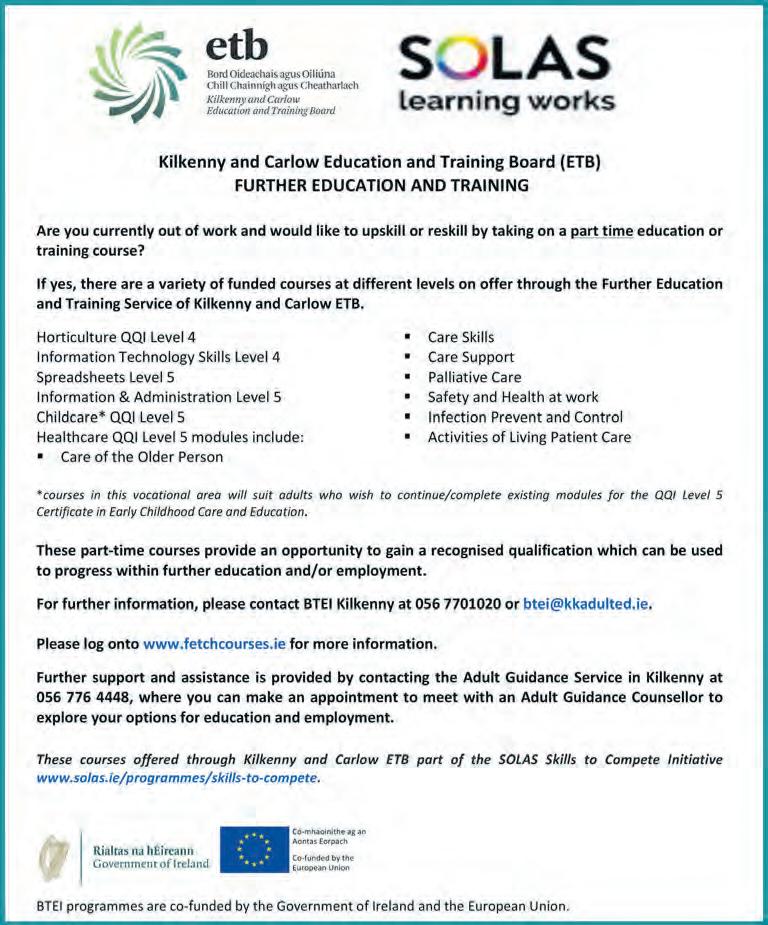
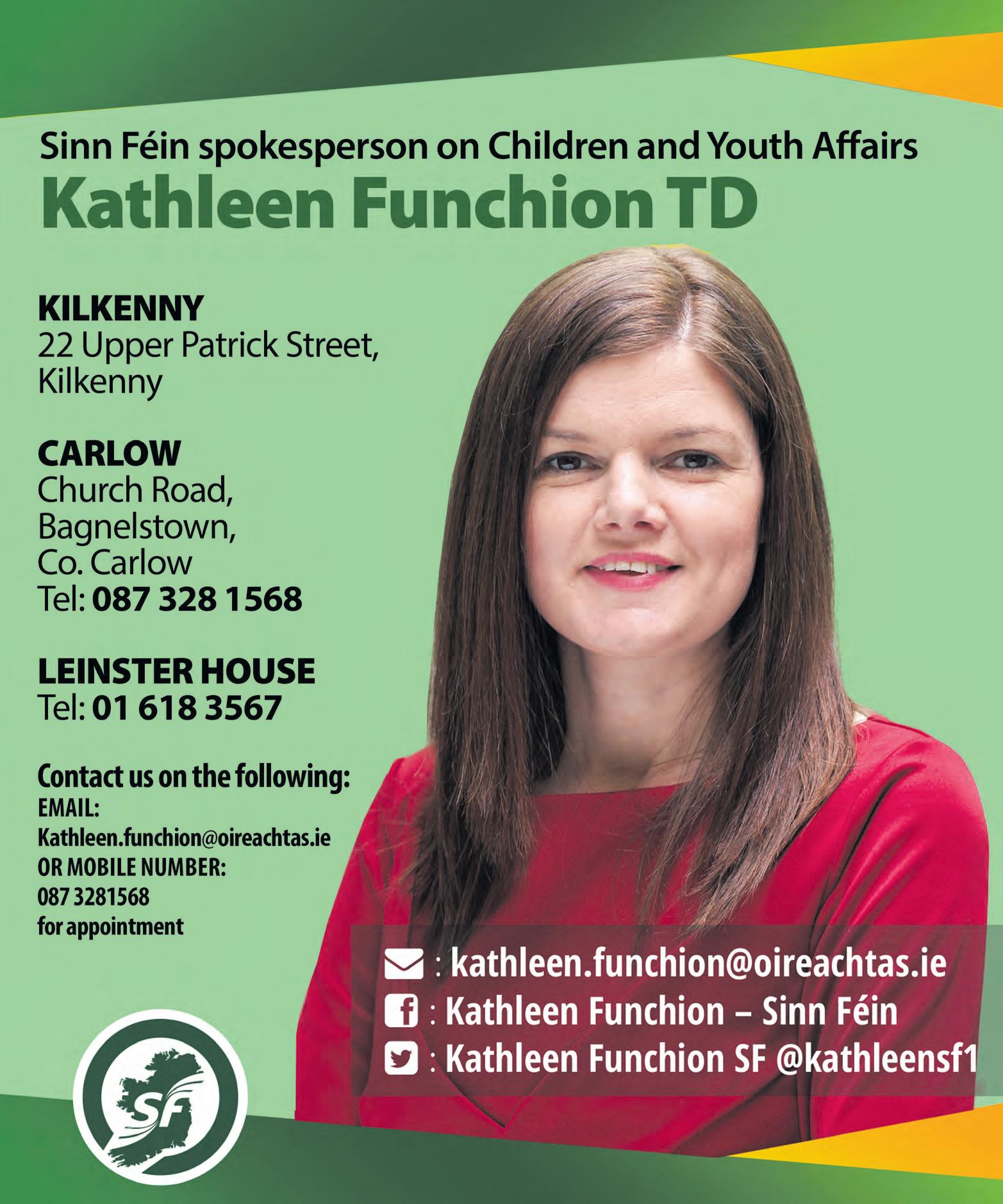
County’s Casual Trading bye-laws come in for scrutiny
KILKENNY County Council has begun a review of the casual trading bye-laws for the county to complement the review of the casual trading bye-laws for Kilkenny City which was completed earlier this year. There has been an increased interest in casual trading since the onset of COVID restrictions with more people now enjoying the great outdoors.
A casual trading licence is required from the council for the selling of goods in public places designated as casual trading areas. Under the council’s byelaws a number of locations in towns and villages across the County are currently designated as casual trading areas, for which an application can be made to the council for a licence to trade.
These are currently located in Graiguenamanagh, Thomastown, Inistioge, Hugginstown, Kells, Castlecomer, Kilmanagh, Gowran and Glenmore. The current bye-laws can be viewed on the Council’s website at: www. kilkennycoco.ie/eng/Services/ Environment/Casual-Trading
The main purpose of the review of the casual trading byelaws is to assess whether or not the number and location of casual trading areas across the county is sufficient. The Council’s Executive will engage with each of the Municipal Districts in the coming months to ascertain their views. Draft Bye-Laws will be presented to the SPC at their meeting in September for consideration before being presented to the Council. The draft bye-laws will then be placed for public consultation.
In advance of the public consultation, the council are now welcoming the views of local communities on the location of casual trading areas across the County.
Ideas on locations setting out why you think the area in question is suitable are welcome for consideration by emailing: environment@kilkennycoco.ie
Child care complaints fall but work ‘to be done’
THE Ombudsman for Children’s Office (OCO) received 24 or 2% of its complaints from Co. Kilkenny in 2020, its Annual Report has revealed.
The report, ‘2020 Childhood Paused’, reveals that the OCO received 1,187 complaints about services provided to children in 2020.
Ombudsman Dr Niall Muldoon said: “We do not know where every single one of our complaints comes from – some complaints relate to more than one area, or there can be more than one child involved. However, we know for sure that 24 complaints came from Co. Kilkenny.
“While this is not very surprising, based on population spread, it shows that we still have to work hard to let people in Co. Kilkenny know that we are here.”
In 2020, 6% of the complaints made to the OCO came directly from children, this is an increase from 3% in 2019. This increase can largely be attributed to those who contacted us in relation to education issues and is an indication of the level of upset among students. 100% of the children who contacted the OCO mentioned the impact of the pandemic on their mental health of children.
Once again, the main area of the public service people complained about in 2020
Dr Muldoon: work still to be donex-was education – making up 46% of complaints. In 2019, 49% of complaints were about education.
New issues that came up in 2020 included: • Remote learning and the digital divide • Lack of clarity about State examinations • Mental impact on young people • Calculated grades • Children in high risk households who feared bringing Covid-19 home • Impact on children with special educational needs
Dr. Muldoon said there can be no return to “normal” for children after the pandemic.
“Lasy year was a devastating year for children. We heard heart-breaking stories of children with additional needs regressing and about the turmoil the uncertainty caused. Children were grappling with the digital divide and they worried about parents who had lost their jobs as the pandemic wreaked havoc on the economy. We know that this impacted children in Co. Kilkenny and all over the country.”
Dr. Muldoon encouraged children, parents or those working with children in Co. Kilkenny to contact the OCO if they have an issue they office might be able to resolve.
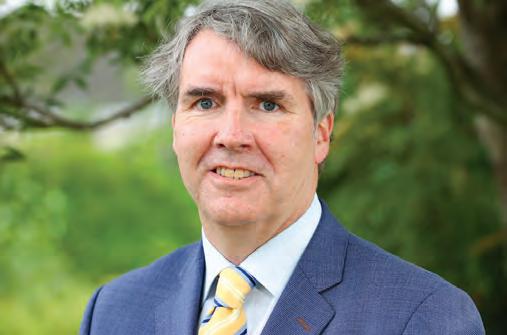
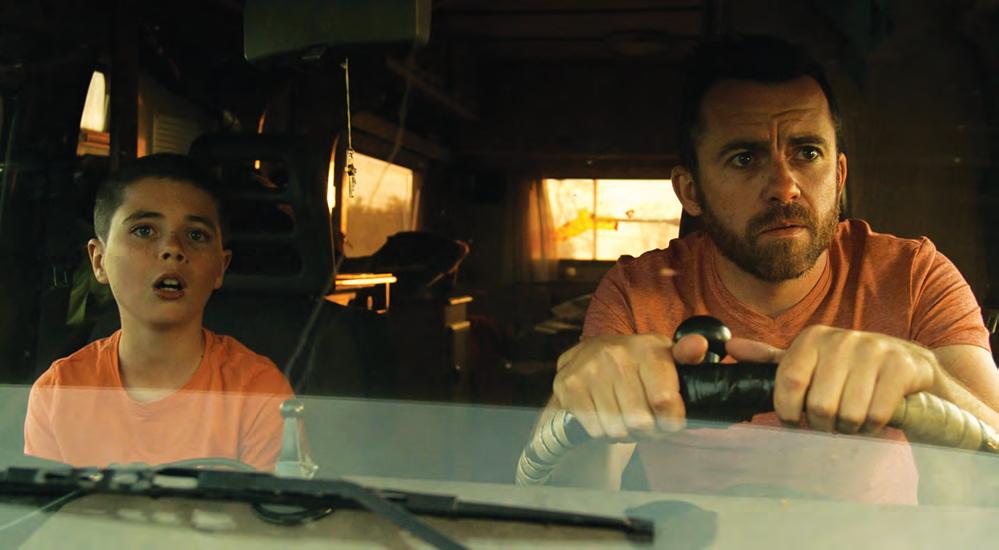
Kilkenny’s very own Poster Boys!
A NEW Kilkenny based film called ‘Poster Boys’ will open in cinemas from July 9. Described as the “road trip movie of the summer”, the comedy-drama tells the story of a dysfunctional uncle, played by Trevor O’Connell, who in a desperate attempt to save his job takes his 10-year-old nephew, played by Ryan Minogue-Lee, on a cross country adventure in a stolen campervan. The film features a host of familiar faces including Keith Duffy, Amy Hughes, Joe Rooney and Ian Dempsey. Poster Boys had its premiere last year at the Galway Film Fleadh and speaking ahead of its cinematic release director Dave Minogue commented: “The film offers a feel-good comedy road trip experience, with a lot of heart, while showing off the beauty of Kilkenny. Viewers will recognise scenes from Thomastown, Goresbridge, Graignamanagh as well as Stoneyford and Mullinavat. The film’s soundtrack includes hits from Bell X1, Horslips, Joe Dolan and an original score from the album ‘A Lifetime of High Fives” by Vyvienne Long”. Poster Boys has another Kilkenny connection. It features entrepreneur Bobby Kerr who also happens to be a financial backer of the project. “The film was made on a tiny budget,’’ explains Minogue, “we approached Bobby with the idea and he agreed to back us. He was incredibly supportive and gave us the freedom to follow our creative vision for the piece. Bobby also has a cameo role in the film as an Icecream man! We’re really looking forward to presenting this to Irish audiences”.
€100 billion fails to dent our gas emissions, according to audit
DESPITE the vast amounts of EU taxpayers’ cash being poured into agriculture, including more than €100 billion earmarked to reduce greenhouse gas emissions from the sector in the last seven years, the new report from the European Court of Auditors (ECA) has just confirmed that agricultural emissions have not come down at all since 2010. Indeed, Irish agricultural emissions have actually increased.
This, according to the ECA, “is because most measures supported by the Common Agricultural Policy (CAP) have a low climate-mitigation potential, and the CAP does not incentivise the use of effective climate-friendly practices.”
Livestock emissions account for around half of emissions from agriculture; they have not decreased since 2010 and have risen sharply in Ireland in this period due to national government policy.
These emissions, the ECA notes, “are directly linked to the size of the livestock herd, and cattle cause two-thirds of them. The share of emissions attributable to livestock rises further if the emissions from animal feed production (including imports) are taken into account”.
The report also notes that the CAP supports climate-unfriendly practices, such as paying farmers who cultivate drained peatlands, representing less than 2% of EU farmland but emitting 20% of EU agricultural greenhouse gases.
Drainage of peaty lands in Ireland to convert them to grass production to feed livestock is a major additional source of GHG emissions in Ireland. Overall, Ireland’s grassland soils are net emitters of approximately 7 million tonnes of CO2 per annum.
Crucially, the ECA report notes that “EU law does not currently apply a polluter-pays principle to greenhouse gas emissions from agriculture.” Were this to change, the high emissions and pollution-intensive Irish model of concentrating on large-scale dairy and beef production, primarily for export, would be liable to pay for the pollution it creates.
This would likely render much of this sector unviable and calls into question government policies such as Food Harvest 2020, Food Wise 2025, and the upcoming plan for 2030, all of which are predicated on ever-expanding dairy herd numbers.
Dr. Elaine McGoff, Natural Environment Officer with An Taisce, said:
“The Court of Auditors report really highlights the need for leadership from Government that recognises the scale of the challenge of reducing agricultural emissions and also takes serious steps to do this while protecting farmers and their livelihoods.”
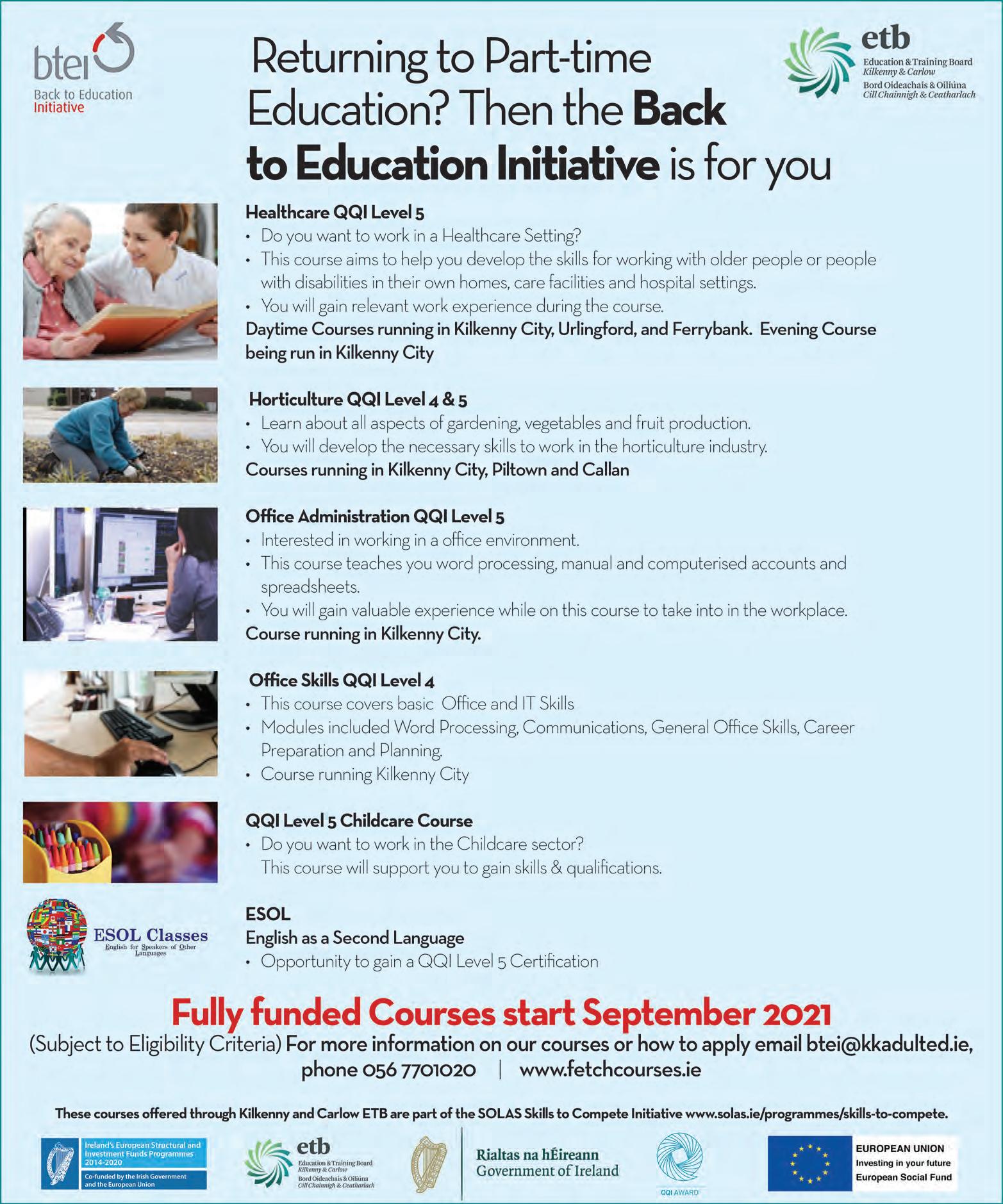
By: Sinéad Blanchfield Music Development Officer, Music Generation Kilkenny E: sinead.blanchfield@ kilkennycarlowetb.ie
28 JULY 2021, Kilkenny: Music Generation Tipperary and Music Generation Kilkenny present TRADCAMP 2021 - a week-long camp for young traditional musicians from both Tipperary and Kilkenny where they will get the chance to learn new tunes and an opportunity to come together and work on a new arrangement of those pieces with one of Ireland’s top professional performers, Lucia McPartlin - all in collaboration with members of the Music Generation Kilkenny and Tipperary musician teams.
Those lucky enough to be part of this camp will also have the chance to be part of a LIVE video recording with Lucia onsite in both Tipperary and Kilkenny on Saturday 17th July, the final day of the camp. This is when the work from the week will come together and the young people will have the chance to perform together and with Lucia. This event will provide a magnificent opportunity for young traditional musicians in Co. Tipperary and Co. Kilkenny to receive advice from one of Ireland’s top professional performers, and above all else, to take the first steps in getting back to playing music together again.
Speaking about the workshop, Music Development Officer with Music Generation Tipperary Aidan O’Donnell said “We are really excited to announce this opportunity for young people in Tipperary and Kilkenny. We’re delighted to have Lucia on board for the workshops, and the fact the young people involved will have the chance to actually play with her, and each other in real life as opposed to a virtual environment, is a really special moment in the context of our collective journey this year”
Lucia McPartlin is a renowned and versatile traditional musician. She is most well known for her work with the band Strung, and the duo Lucia and Maria, as well as performing with Irish Women in Harmony. From Ballina, Co. Tipperary, Lucia is a highly decorated fiddle player having studied at both the Cork School of music and the University of Gothenburg. Lucia is also an experienced teacher and facilitator, teaching both internationally and here in Ireland at various events and festivals.
Speaking about Tradcamp 2021, Sinéad Blanchfield, Music Development Officer with Music Generation Kilkenny said “I’m delighted to have the opportunity to collaborate with our Music Generation neighbours in Tipperary on this fantastic initiative. There is a wealth of young musical talent in both counties and the aim of the camp is to get young musicians together- playing, learning new tunes and skills, recording and having fun along the way.
Music Generation Kilkenny has been forging forward in 2021 with a great line-up of programmes and events across schools and the community in Kilkenny City and County. Since its inception in 2019, over 6,000 children and young people have participated in the programme.
The mission of Music Generation is to transform the lives of children and young people by giving them access to the breadth of high-quality performance music education, enabling them to develop their creativity, reach their full potential, achieve selfgrowth and contribute to their personal development within a vibrant music community.
Tradcamp is open to young traditional musicians aged 8 – 18 years, with a minimum of two years’ experience on their instrument. All instruments will be catered for, including traditional accompaniment on guitar.
The cost is €50 per participant for the 5- day camp including the LIVE and IN-PERSON recording experience.
Limited spaces available due to Covid-19 restrictions. Places will be allocated on a first come first served basis so register now to avoid disappointment! Registration closes on Thursday 8th July.
TO REGISTER CONTACT: Kilkenny: 087 176 5493 (SARAH) E: musicgenerationkilkenny@kcetb.ie Tipperary: 086 078 8016 (EILEEN) E: musicgeneration@tipperaryetb.ie or DM on Facebook (musicgenerationkilkenny)
Ditch the diet – lose weight naturally!
ANDREW MCDONALD HYPNOTHERAPIST
EAT breakfast! Two simple words, one easy action but something which can radically alter your relationship with food and your weight with a minimum of effort. Many people think skipping breakfast will help them to eat less and lose the pounds. Actually the complete opposite is true! By not eating breakfast you’ll almost certainly end up eating more during the day. So make time to eat properly in the morning. Choose liquids wisely! Many people don’t realise the amount of calories in their drinks. An Americano is less fattening than a cappuccino or a latte. Tea with a splash of low fat or skimmed milk contains fewer calories than a full fat milky cup. Water or fruit juice are much better for your weight than fizzy drinks. If you’re having an alcoholic beverage, wine and spirits generally contain less calories than a pint of beer or cider. Be wise on the mixers if you’re enjoying a long drink though!
Perhaps a little more difficult but well worth the effort is changing your eating habits. This can be relatively easy like switching sugary snack foods for fruit or require a bit of extra effort like deciding a cut off point in the evening after which you don’t eat anymore. If you’re somebody who likes to eat big meals, eating smaller portions can be challenging but will definitely help.
Hypnotherapy can help massively with those tasks which are harder to achieve but which bring better results. Through hypnosis you can programme your mind to naturally avoid unhealthy snack foods and seek out healthier alternatives. This then becomes part of your natural behaviour and you will lose weight without even noticing the effort you’re having to put in to get there.
Hypnotherapy can also help you with getting motivated to start exercising. If you can begin an exercise routine, you’re already a long way down the road towards achieving your ideal weight. Your eating habits are only part of the battle to getting yourself looking and feeling great. Starting exercising is often the trickiest part but through hypnosis you can steel your resolve to get moving! Hypnotherapy can also give you the benefits of a gastric band without the painful surgery. By convincing your mind that you have a gastric band fitted, your body will naturally be satisfied with eating smaller portions of food.
Switch to lighter versions! The amount of calories in various condiments and dressings can often be astonishing. Low fat versions can make a big difference!
Eat protein with every meal! It leaves you feeling fuller for longer as well as help to keep your blood-sugar levels steady. This will naturally lead to you needing to eat less often and cutting out more snacks.
These are some far more successful alternatives to dieting. Try a couple of them and see how things work out for you! What have you got to lose other than the pounds?
Sage a helpful plant for memory
CLAIR WHITTY
MANY of you will be familiar with the herb sage. It’s best known as a female tonic and is commonly associated with cooling hot flushes and night sweats. It can be used by both men and women who overheat, helping with sweaty hands and sweaty feet too. But leaving the conversation there would do sage an injustice. Sometimes herbs can be put in one box with one health benefit when they can offer us much more help.
For example, sage can support cognitive function, reduce brain fog, improve sluggish memory and recall for both men and women. I was reading some research which showed that those taking sage extract performed better on tests that measured memory, problem solving, and reasoning.
I’ve also read that it may be helpful to relieve stomach cramps and reduce anxiety. Its antibacterial properties make it a useful herb to help sore throats and tonsilitis. You can gargle with sage tea or if you prefer you can use a herbal sage tincture like A.Vogel Menosan.
If you grow sage, you could make your own tea fresh from the garden. Or, if you prefer, you can get Sage tea bags, the brand I like is Salus – they’re quite potent. To make a tea using fresh sage add one or two teaspoons of the chopped herb into a cup of boiling water that has rested for a bit. Leave to infuse for 5- 7 minutes and then enjoy. You can have two or three cups per day. If you’re on medication do be careful as it may increase the action of some medication. You could also add some fresh sage to food: for example, food garnish, add to stuffing, make sage butter, simply add to your favourite pasta dish and enjoy. If you don’t have sage in your garden or if you prefer to take a supplement you could try A.Vogel Menoforce Sage supplements.
It’s great to know that sage which we can find in our garden can help alleviate some menopausal symptoms, help with cognitive function, and general health too. Like I said, it’s much more than just a coolant! Stay cool and focused with sage, you don’t have to be a gardener to get the benefits!









